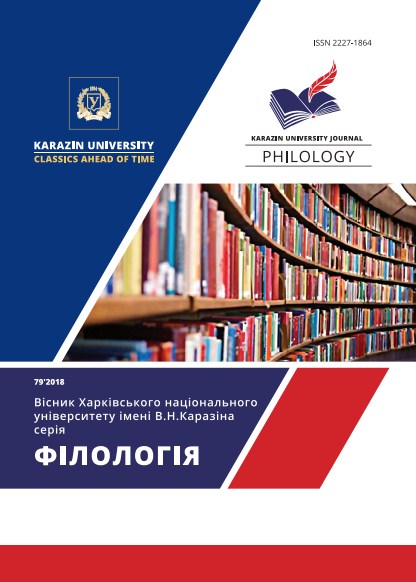Metatheatricality of Aristophanes’ comedies in the context of development of European drama
Abstract
Metatheatricality becomes one of the dominants of modern theatre development. Most scholars agree that main feature of metatheatricality is self-reference and that first examples of metatheatre can be found in Ancient Greek drama. The appearance of meta-theatrical elements is directly connected with the formation of one of the principal conflicts of the theatre's inner development – innovation in drama and theater fields was not only rejected, but also ceased to exist with the transition from Old comedy to New one. The comedy used the form of theatrical presentation of the tragedy itself as a "concrete form", but it didn’t mean that comedy was just a parody of a tragedy or tried on her suit, it meant that the drama work was perceived as an independent way of knowing reality. Plays by Aristophanes not only contain multiple examples of drama’s self-reference at the plot and performance level (such plays as “Acharnians”, “Peace”, “Thesmophoriazusae”, “Frogs”), but represent theatrical and historical context for analysis of metatheatrical tendencies in Ancient tragedy. From one hand, metatheatricality of Aristophanes’s comedies became the example for Euripides’s genre shift, from other hand – it was totally abandoned in Menander’s New comedy. Theoretical comprehension of the theatre as an object and subject of art was no longer considered as feature of a play, but became the aim of Aristotelian literary theory. The development of Greek comedy from Aristophanes to Menander represents invariant of European theatre development, where metatheatricality is replaced by artistic credibility and ability for self-reference is replaced by systematised literary critics.
Downloads
References
Арістофан. Комедії : пер. із старогрецької / Арістофан. – Харків : Фоліо, 2002. – 511 с. – (Б-ка світової літ.).
Забудская Я. Рецепция как элемент сюжетосложения комедии [Электронный ресурс] / Яна Забудская // Вопросы классической филологии. Вып. XV. ΝΥΜΦΩΝ ΑΝΤΡΟΝ [Пещера нимф] : сб. статей в честь А. А. Тахо-Годи. – М. : Никея, 2010. – С. 104–117. – Режим доступа: http://www.philol.msu.ru/~classic/doc/sbornik--a-a-tacho-godi.pdf
Политыко Е. Н. Метадрама в современном театре (к постановке проблемы) / Евгения Политыко // Вестник Пермского университета. – Вып. 5 (11), 2010. – С. 165–174.
Фрейденберг О. М. Миф и литература древности / Ольга Фреденберг; сост., послесл., коммент. Н. Брагинской. – 3-е изд., испр., доп. – Екатеринбург : У-Фактория, 2008. – 896 с. – (Bibliotheca mythologica).
Abel L. Metatheatre: A new view of a dramatic form / L. Abel. – New York, 1963. – 168 p. P. 78-79.
Dobrov G. W. Figures of Play: Greek Drama and Metafictional Poetics / G. W. Dobrov. – Oxford : Oxford university press, 2001. – 240 p.
Hornby R. Drama, Metadrama and Perception / R. Hornby. – London, 1986. – 192 p. P. 80-83.
Slater N. W. Spectator Politics. Metatheatre and Performance in Aristophanes / Niall W. Slater. – Philadelphia : University of Pennsylvania Press, 2002. – 363 p.
Smith R. L. Metatheatre in Aeschylus’ Oresteia [Electronic resource] / Robert Lewis Smith // Athens Journal of Philology. Vol. X, No Y. – 2010. – Mode of access: https://www.atiner.gr/journals/philology/2014-1-X-Y-Smith.pdf
Taplin O. Fifth-Century Tragedy and Comedy: a Synkrisis / Oliver Taplin // Journal of Hellenic Studies CVI. – 1986. – P. 163–174.
Zeitlin F. The closet of masks: role-playing and myth-making in the Orestes of Eurepides / Froma I. Zeitlin // Ramus : Critical studies in Greek and Roman literature. – Vol. 9, N. 1. – 1980. – P. 51–77.
References
Aristofan (2002) Komedii : per. iz starohretskoi [Comedies]. Kharkiv : Folio. [in Ukranian]
Zabudskaya, Ya. (2010) Recepciya kak element syuzhetoslozheniya komedii [Reception as an element of a plot of a comedy]. Voprosy klassicheskoj filologii [Questions of classical philology, electronic recource], no. 15. ΝΥΜΦΩΝ ΑΝΤΡΟΝ [Peshera nimf] : collection of articles in honor of A. A. Tajo-Godi. Moscow : Nikeya, pp. 104–117 Avaliable at: http://www.philol.msu.ru/~classic/doc/sbornik--a-a-tacho-godi.pdf
Polityko, E. N. (2010) Metadrama v sovremennom teatre (k postanovke problemy) [Metadrama in the modern theater (to the problem statement)]. Bulletin of the Perm University, no. 5 (11), pp. 165–174.
Frejdenberg, O. M. (2008) Mif i literatura drevnosti [Myth and literature of antiquity]. Ekaterinburg : U-Faktoriya.
Abel, L. (1963) Metatheatre: A new view of a dramatic form. New York, pp. 78–79.
Dobrov, G. W. (2001) Figures of Play: Greek Drama and Metafictional Poetics. Oxford : Oxford university press.
Hornby, R. (1986) Drama, Metadrama and Perception. London, pp. 80–83.
Slater, N. W. (2002) Spectator Politics. Metatheatre and Performance in Aristophanes. Philadelphia : University of Pennsylvania Press.
Smith, R. L. (2010) Metatheatre in Aeschylus’ Oresteia [Electronic resource]. Athens Journal of Philology. Vol. X, No Y. Available at: https://www.atiner.gr/journals/philology/2014-1-X-Y-Smith.pdf
Taplin, O. (1986) Fifth-Century Tragedy and Comedy: a Synkrisis. Journal of Hellenic Studies CVI, pp. 163–174.
Zeitlin, F. (1980) The closet of masks: role-playing and myth-making in the Orestes of Eurepides. Ramus : Critical studies in Greek and Roman literature. Vol. 9, no. 1, pp. 51–77.




